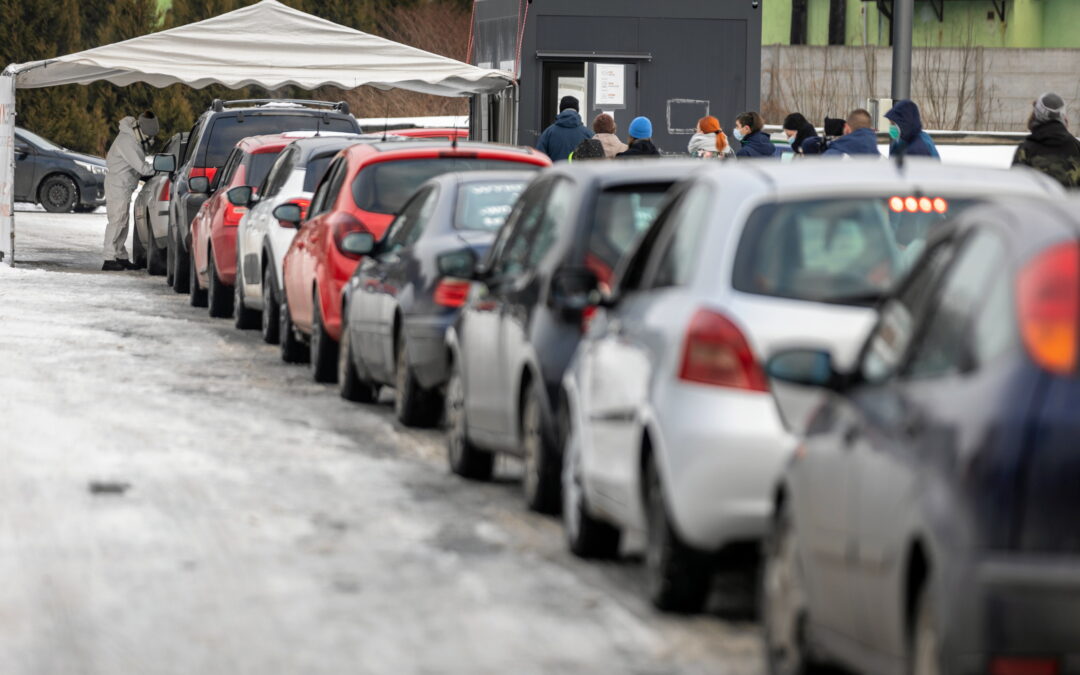Queues have been building up outside testing centres as Poland struggles to contain the spread of the Omicron variant, which has led to all-time record numbers of infections. In some cases, people have been waiting hours for tests.
Meanwhile, although a government scheme for pharmacies to offer free lateral-flow tests began today, only around 100 out of 13,000 pharmacies across the country have so far signed up.
Today saw Poland again break its record for new COVID-19 cases, with 57,659 reported this morning, beating yesterday’s figure of 53,420. As infections have surged over the last two weeks, testing centres have found themselves under increasing strain.
People with symptoms and/or who have had contact with someone infected with the virus can register for a free PCR test. However, appointments for these have been running low. On Monday, almost 222,000 people registered, followed by 205,000 on Tuesday, reports Gazeta Wyborcza.
Even once people receive a referral, they are typically having to queue 30 to 45 minutes at the testing site, and in many cases several hours, reported news website Onet today.
Długie kolejki do testów na koronawirusa na Pomorzu. "Dlaczego nie otworzą więcej punktów?" https://t.co/2r3llpQsSJ pic.twitter.com/RU7gsYsOBW
— Onet Wiadomości (@OnetWiadomosci) January 25, 2022
“I waited one and a half hours, despite having a time for the test scheduled,” one woman in Gdańsk told Interia. “People in front of me said they had been waiting more than two hours.”
A doctor, Joanna Zabielska-Cieciuch, told the news service that requiring people who may already be in ill health to wait for so long in the winter weather “is simply unethical”.
Drive-in testing centres, meanwhile, have created particularly large and disruptive queues, with cars blocking some streets in Warsaw for hours, writes Gazeta Wyborcza. In Wejherowo, a town of 50,000 in northern Poland, local media showed images of cars clogging roads around the testing centre at a hospital.
In response to the problems, the number of testing centres has been increased and their working hours extended. Over the last month, the health ministry has set up almost 50 new testing points, bringing the total to 680 nationwide. More are set to be opened in the coming days.
Those locations currently offer PCR tests, but a deputy health minister, Waldemar Kraska, told Interia this week that the government is planning to soon start offering quicker lateral flow (antigen) tests at the same sites.
The government also announced last Friday that free lateral flow tests would be offered at pharmacies. Today was the first day that the new system went into force.
However, this morning the health minister, Adam Niedzielski, announced that only 64 pharmacies nationwide were offering the tests. Later in the day, his department announced that the figure had increased to 105.
The health ministry told Gazeta Wyborcza on Wednesday that so far 5,000 pharmacists had undergone training on how to conduct the tests, showing that there was significant interest.
However, only pharmacies with suitable infrastructure, meaning a separate room and ability to fulfil required safety standards, will be able to offer the tests. A further limiting factor has been the limited supply of the tests, starting at just 100 per outlet, reports the newspaper.
“I think that 99% of pharmacies in Poland don’t meet the requirements to join the programme,” Robert Duczyński, the manager of a pharmacy in Radogoszcz, told TVN24. Other pharmacies told the broadcaster that offering the tests was not worthwhile for them, and that they had not been given enough time to prepare.
64 apteki na 13 tysięcy działających w kraju.
No jest to raczej umiarkowanie spektakularny sukces… https://t.co/gWFj4Z0Rmm
— Krzysztof Berenda (@k_berenda) January 27, 2022
Main image credit: Grzegorz Celejewski / Agencja Wyborcza.pl

Maria Wilczek is deputy editor of Notes from Poland. She is a regular writer for The Times, The Economist and Al Jazeera English, and has also featured in Foreign Policy, Politico Europe, The Spectator and Gazeta Wyborcza.




















